Human Rights Day is celebrated yearly across the
world on the 10 of December, which marks the anniversary of the adoption
by the United Nations of the 1948 Universal Declaration of Human Rights.
Awakened from the nightmares of war, the community of nations put their
act together and stood united in proclaiming the universality,
indivisibility and interdependence of human rights and on the moral
obligations of states to protect these rights. The 2009 Human Rights Day
celebration was focused on the concept of nondiscrimination, a theme
central to the concept of human rights and explicitly stipulated in
Article 1 of the Declaration that says, "ALL HUMAN BEINGS ARE BORN FREE
EQUAL IN DIGNITY AND RIGHT."
Sixty-one years since the adoption of the
Declaration, human rights violations are still rampant today. Millions
of people all over the world continue to suffer from the curtailment of
their basic right to life and liberty. For the majority of peoples in
Asia in particular, human rights remain an empty promise, an elusive
dream.
Asia, the world’s biggest and most populated
continent, earns the negative reputation as the most dangerous place to
live in because of its notorious human rights record. In many Asian
countries, human rights are not only blatantly ignored but are under
severe contempt wherein political repression reigns under a climate of
impunity. Everyday, countless transgressions of human rights occur while
the vast
majority of their abusers go unpunished and future
violations are not remote possibilities. Concretely, Asia is the
continent which submitted the highest number of enforced disappearance
cases to the UN Working Group on Enforced or Involuntary Disappearances
(UNWGEID) in recent years. For one, the Philippines is one of the
countries with outstanding cases of enforced disappearances, a situation
which had, in 2007, urged the UNWGEID to request from the Philippine
government for an invitation for a visit to the country after its first
visit in 1990. Such a request remains unanswered up to this day.
The very reason why six decades ago, the Declaration
was crafted and adopted by the community of nations was to assert,
promote and protect the rights of every human being. This reason still
remains relevant, making it imperative for us to celebrate the Human
Rights Day. Celebrating this day strongly reminds us that the struggle
to make human rights a reality is not yet over. Everyone has the
obligation to act in order to attain the full realization of human
rights for all.
Speaking the Unspeakable
The Asian Federation Against Involuntary
Disappearances (AFAD), a regional federation of human rights
organizations working directly on the issue of enforced or involuntary
disappearances, joined the rest of the world in commemorating the
Human Rights Day by conducting the On-The-Spot Poetry Writing and
Reading Contests entitled, "Celebrating Human Rights through Poetry
and Music." The AFAD believes that art is a universal language that
connects humanity across time and space and can be used to serve as a
voice of justice, peace and equality throughout the recent history.
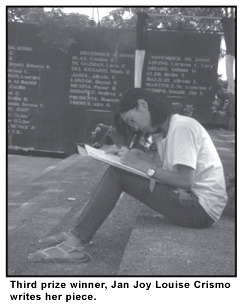 Through
this activity, it aimed to educate especially the young people about the
gravity of the crime and the urgency to combat this global phenomenon
through a global response. The contest also served as a venue to
springboard the direct and active participation of the youth in the
AFAD’s human rights work by speaking, through poetry, the unspeakable
situation of the Asian desaparecidos and their families.
Through
this activity, it aimed to educate especially the young people about the
gravity of the crime and the urgency to combat this global phenomenon
through a global response. The contest also served as a venue to
springboard the direct and active participation of the youth in the
AFAD’s human rights work by speaking, through poetry, the unspeakable
situation of the Asian desaparecidos and their families.
Enforced disappearance, though considered as one of
the cruelest forms of human rights violations, is not getting the public
attention that it deserves. The AFAD, through its secretariat and its 9
member-organizations in 7 Asian countries, has been working incessantly
for more than a decade to bring the issue of enforced disappearance in
the international and national spotlight. Little is known that across
the Asian region, thousands of people are made to disappear and their
fate and whereabouts remain uncertain while many cases of disappearances
are still being reported daily. The depth of the sufferings of the
victims and their family members is unfathomable. The desaparecidos
are cut off from the rest of the world, placed outside the
protection of the law and are often tortured or killed, but their
remains are not returned. Many are never seen or heard of again. While
their families are left with the uncertainty of searching and longing
for the return of their disappeared loved ones, their struggle for
justice is almost a futile exercise in a situation where there is an
absence of legal mechanisms which consequently could have filled in the
gap that prevents those responsible from being brought to justice.
It is in this context that the AFAD explored the use
of the artistic and literary genres such as poetry and music as powerful
tools to point out these societal ills; to call the public attention to
act on what is happening and to awaken them on the need for a genuine
social change.
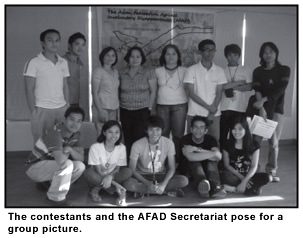 Poetry,
though, maybe considered by some as a drab and a mere abstract literary
endeavor reserved and enjoyed only by a few eccentrics. But for human
rights communities worldwide, poetry like any other literary genres has
become a medium of advocacy. Poetry as an artistic form of expression
conveys a message that ordinary people can relate to. There is no right
or wrong way to write a poem. No one can tell someone what and how they
are supposed to write about their feelings and views of reality because
in poetry, one can express what is within him or her. Poetry appeals to
one’s sanity and moral sensitivity to evoke the unspoken and serves as a
voice of the universal conscience. It has the power to reflect the
innermost sentiments of the heart and the soul. Human rights in poetry
are usually based on horrifying conditions. But poetry also serves to
demonstrate the creativity and resilience of the human spirit. While
depicting grief and pain, poetry can also bring with it the freshness of
hope in the face of the oppression, injustice and cruelty.
Poetry,
though, maybe considered by some as a drab and a mere abstract literary
endeavor reserved and enjoyed only by a few eccentrics. But for human
rights communities worldwide, poetry like any other literary genres has
become a medium of advocacy. Poetry as an artistic form of expression
conveys a message that ordinary people can relate to. There is no right
or wrong way to write a poem. No one can tell someone what and how they
are supposed to write about their feelings and views of reality because
in poetry, one can express what is within him or her. Poetry appeals to
one’s sanity and moral sensitivity to evoke the unspoken and serves as a
voice of the universal conscience. It has the power to reflect the
innermost sentiments of the heart and the soul. Human rights in poetry
are usually based on horrifying conditions. But poetry also serves to
demonstrate the creativity and resilience of the human spirit. While
depicting grief and pain, poetry can also bring with it the freshness of
hope in the face of the oppression, injustice and cruelty.
Poetry is also a therapeutic instrument to express
intense emotions caused by the traumatic experiences particularly of
those who have suffered directly or indirectly from human rights
violations. It can be an effective coping mechanism through an
internalization of a tragic event and transcending from its
devastating effects. Poetry penetrates the deepest recesses of one’s
being, thus could serve as an effective tool to generate support for
human rights advocacy.
Vying for Honor, Joining the Cause
The poetry writing contest was held on 4 December
2009 at the Bantayog ng mga Bayani (Heroes’ Monument) in
Quezon City, Philippines. It was organized by the AFAD Secretariat which
is based in Manila. This activity was part of the annual commemorative
activity of the federation that was done simultaneous with the
activities in the other member-organizations from six other Asian
countries and was done in the context of the continuing campaign for the
entry into force and eventual implementation of the UN Convention for
the Protection of All Persons from Enforced Disappearance. Earlier on
the same day, at the Executive Lounge of Quezon City Hall, a roundtable
discussion on enforced disappearance was organized by the Families of
Victims of Involuntary Disappearance (FIND) in cooperation with the AFAD,
the Office of Councilor Janet M. Malaya, Chairperson of the Committee on
Justice and Human Rights of the Quezon City Council.
The poetry writing and reading contests were open to
young Filipinos who can write short poems in Filipino or English based
on a given theme. Ten young men and women coming from different
universities in Metro Manila eagerly participated. Three of them are
family members of desaparecidos. The writing contest was divided
into two parts. The morning session was spent in showing documentary
films which provided the contestants with the valuable information on
the issue. The actual writing contest was done in the afternoon.
Although the contestants were there primarily to vie
for the honor and to win the prizes at stake, amounting to Php 7,000,
Php 5,000, and Php 3,000 for the first prize, second prize and third
prize respectively, it was made clear to them that the contest was more
importantly a form of advocacy and that their works would become part of
the AFAD advocacy materials. While the competitive atmosphere provided
encouragement for the contestants to do their best, it was the act of
sharing their talents for a noble cause that provided the motivation for
them to produce magnum opus worth the recognition. Out of the ten
contestants, nine of them wrote their literary pieces in Filipino and
only one entry in English. All of them, albeit distinct in styles and
moods, wrote about the common pain brought about by the crime of
enforced disappearance and about the significant values of recognizing
and protecting human rights as an integral part of development.
A Night of Celebration
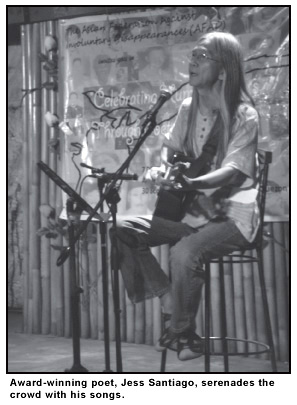
The AFAD’s Human Rights Day celebration culminated
with the poetry reading and the awarding ceremony held on 8 December at
Access Point Resto Bar and Grill, Scout Borromeo St., South Triangle,
Quezon City. More than sixty people coming from different human rights
and civil society organizations, families of the disappeared, government
agencies, diplomatic community and friends of AFAD were present to grace
the event.
Mr. Jess Santiago and Ms. Dom-an Macagne- Manegdeg
performed at various times throughout the evening. Human rights activist
and musician, Santiago, who is also an award-winning poet himself having
had his poems published in both national and international magazines and
having been chosen as the Institute of Philippine Languages’ Poet of the
Year in 1978 and 1979, serenaded the crowd with a rendition of his 1990
popular song, Halina (Come). Ms. Florence Macagne-Manegdeg, also
known as Dom-an, a nose flute player from Sagada and a widow of a slain
NGO-church worker, Jose (Pepe) Riveral Manegdeg III who was engaged in
the peace and healing initiatives, rendered an instrumental music of the
sacred breath by playing the flute. In the interlude, she told the crowd
that she no longer dwelt in anger and sorrow for her husband’s murder
and in fact, had already forgiven the perpetrators. Through her own
music and poetry, she shared her journey towards the peace and healing
of the rest of humanity.
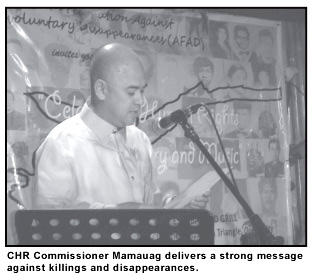 To
elicit audience participation, the celebration provided everyone the
opportunity to read poems. Commissioner Jose Manuel Mamauag of the
Commission on Human Rights (CHR) delivered a strong message about the
human rights situation in the Philippines. Ms. Ana Galindo of the
Embassy of Spain took the center stage to read a poem in Spanish which
she translated to English. Other representatives of human rights NGOs
took turns in reading poems. Also present during the event was a
representative from the Indonesian Embassy, Mr. Hadi Tjahjono.
To
elicit audience participation, the celebration provided everyone the
opportunity to read poems. Commissioner Jose Manuel Mamauag of the
Commission on Human Rights (CHR) delivered a strong message about the
human rights situation in the Philippines. Ms. Ana Galindo of the
Embassy of Spain took the center stage to read a poem in Spanish which
she translated to English. Other representatives of human rights NGOs
took turns in reading poems. Also present during the event was a
representative from the Indonesian Embassy, Mr. Hadi Tjahjono.
Nevertheless, the evening still principally belonged
to the contestants who came to the event in order to compete and to
share their talents to the cause for the disappeared. When the poetry
reading contest began, the contestants took turns in reading their poems
with virtuosity, mindful or perhaps, unmindful that only one among them
would be chosen as the Best Presentor.
Prior to the event, the AFAD Secretariat selected two
panels of judges for the contests. The judges were chosen from the local
human rights community and friends from the academe. They are not only
known for their significant contribution to human rights but also for
their talents in the field of the literary arts. The panel of judges for
poetry writing contest was composed of Mr. Ed Gerlock, Executive
Director of the Coalition of the Services for the Elderly (COSE); Mr.
Joey Faustino, Council member of the Families of Victims of Involuntary
Disappearance (FIND); Prof. Virgilio Rivas, Director of the Institute
for Social History- PUP and Dr. Nymia Simbulan, Executive Director of
the Philippine Human Rights Information Center (Philrights). Dr. Nymia
Simbulan and Mr. Joey Faustino remained until the end of the program of
the poetry reading contest. They were joined by Commissioner Mamauag for
the selection of the Best Presentor.
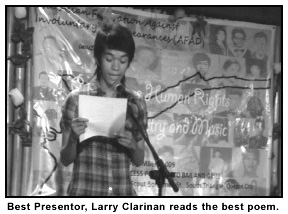 When
all was said and done, the evening came to a close with the announcement
and awarding of winners by Dr. Nymia Simbulan, Dr. Emilia Aquino, AFAD
Administrative Officer and Mary Aileen D. Bacalso, AFAD
Secretary-General. The major awards for both contests went to Mr. Victor
Guerrero Ferdinez, a son of a Filipino desaparecido, Mr. Victorio
Ferdinez who disappeared in Marulas, Valenzuela City a year before the
1986 EDSA Uprising (Please see the translated winning piece at the
back cover of this publication). His mother, Ms. Sarah Ferdinez is a
member of FIND and a volunteer of the Bantayog ng mga Bayani.
Victor, who almost failed to make it that evening, appeared cheerfully
to receive his award for his best poem, Ang Patlang (The Gap).
His friend, Mr. Larry Clarinan, whom Victor requested at the last minute
to read his piece, was named as the Best Presentor. The other
contestants who were lauded with the well-deserved recognition were Mr.
Rojo Guerrero Mallari and Ms. Jan Joy Louise Crismo for winning the
second and third prizes respectively. Mr. Rojo Mallari, a senior student
of the Polytechnic University of the Philippines is working as an intern
for the Bantayog ng mga Bayani. Ms. Jan Joy Louise Crismo is a
daughter of Mr. Louie Crismo, a former Secretary General of FIND and
younger brother of Romeo Crismo who disappeared in 1980 during the dark
years of martial law in the Philippines. Although, all contestants were
awarded with certificates, the AFAD Secretariat deemed it important to
give special awards to two entries. These special awards were given to
Mr. Jan Merck Maguddayao, a student activist for the University of the
Philippines and Mr. John Kenneth Macaspac, a student of TRACE College-Makati.
When
all was said and done, the evening came to a close with the announcement
and awarding of winners by Dr. Nymia Simbulan, Dr. Emilia Aquino, AFAD
Administrative Officer and Mary Aileen D. Bacalso, AFAD
Secretary-General. The major awards for both contests went to Mr. Victor
Guerrero Ferdinez, a son of a Filipino desaparecido, Mr. Victorio
Ferdinez who disappeared in Marulas, Valenzuela City a year before the
1986 EDSA Uprising (Please see the translated winning piece at the
back cover of this publication). His mother, Ms. Sarah Ferdinez is a
member of FIND and a volunteer of the Bantayog ng mga Bayani.
Victor, who almost failed to make it that evening, appeared cheerfully
to receive his award for his best poem, Ang Patlang (The Gap).
His friend, Mr. Larry Clarinan, whom Victor requested at the last minute
to read his piece, was named as the Best Presentor. The other
contestants who were lauded with the well-deserved recognition were Mr.
Rojo Guerrero Mallari and Ms. Jan Joy Louise Crismo for winning the
second and third prizes respectively. Mr. Rojo Mallari, a senior student
of the Polytechnic University of the Philippines is working as an intern
for the Bantayog ng mga Bayani. Ms. Jan Joy Louise Crismo is a
daughter of Mr. Louie Crismo, a former Secretary General of FIND and
younger brother of Romeo Crismo who disappeared in 1980 during the dark
years of martial law in the Philippines. Although, all contestants were
awarded with certificates, the AFAD Secretariat deemed it important to
give special awards to two entries. These special awards were given to
Mr. Jan Merck Maguddayao, a student activist for the University of the
Philippines and Mr. John Kenneth Macaspac, a student of TRACE College-Makati.
When everyone thought that the night was over, the
lights dimmed and started to flicker. To the audience’s delight, the
resident band emerged and performed. They were later joined by the two
contestants, Kenneth and his schoolmate, Casey Bautista who entertained
everyone with their talents in music.
As the music continued, the mood and atmosphere
further turned celebratory and went on until the dead of the night.
Truly, poetry and music provide a message of celebration. The occasion
was not just a mere fancy that passes for a flitting moment, but
an attempt to tell the truth in a meaningful and fuller fashion. Others
insist that ideas can change the world, yet poetry and music may not
change the world. But as an art, they enable us to see life in its
wholeness, with a greater clarity and deeper understanding of what we
are and what we can become.
Indeed, the great theatre of the world, according to
John Holcombe in his article posted in www. textetc.com, is written in
verse and its melody reconciles us to the manifest absurdities,
injustices and cruelties of our times.

Darwin Mendiola is currently the Philippine Advocacy Project
Coordinator of the AFAD. He has worked in various non-government
organizations that engage the Philippine government in formulating and
implementing policy reforms and institutional changes. Darwin is a
former media liaison of the Laban ng Masa (Struggle of the Masses), a
new Philippine Left Coalition under the leadership of ex-UP President,
Dr. Francisco Nemenzo, Jr. As a former student leader in the Polytechnic
University of the Philippines in the early 1990s, he remains an activist
in his own right.